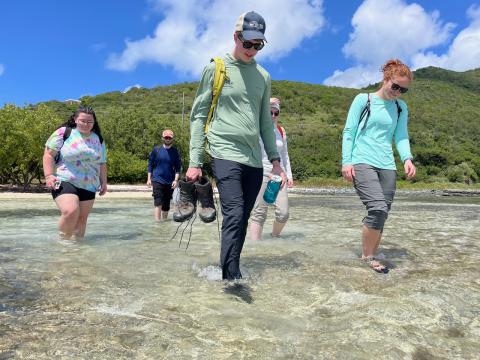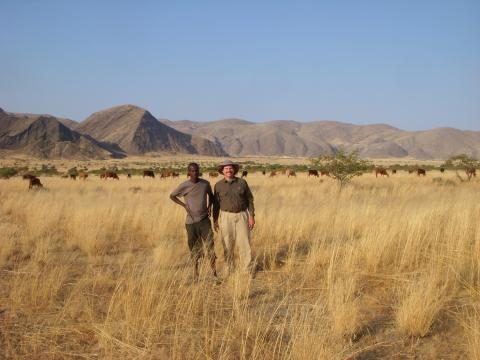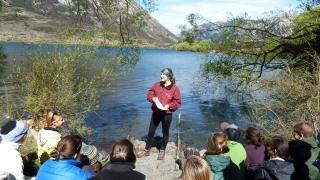Studying abroad is your ticket to the world.
Along with the programs available through the UNH Global Education Center, COLSA administers its own study abroad programs. Immerse yourself in the Italian food system from the medieval city of Ascoli Piceno, explore the African wildlife and livestock management of Namibia over spring break, or take advantage of two study abroad experiences in New Zealand, one focused on timely and relevant ecological field studies, the other on sustainable agriculture — all while being exposed to new cultures and ideas and meeting new and interesting people.
Now is your chance to join the roughly 700 UNH students who study abroad every year and have an enriching and life-changing adventure.
British Virgin Islands

Spring break
This discussion-based course combines weekly lectures in Durham, with an embedded faculty-led study abroad component in the British Virgin Islands over Spring Break.
Designed to engage students from at least two coastal geographies (NH and the British Virgin Islands), we will explore the past, present, and future trends that threaten coastal resilience of natural and built infrastructure and the organisms that inhabit them. Leveraging the perspectives and personal experiences of all in the class, we will consider both public perception and scientific basis concerning coastal threats, sea level rise, and climate related issues with open minds to build a baseline for understanding.
Through this lens we’ll explore the dimensions of major issues coastal communities face, discuss potential causes or contributing factors for these threats, and consider the role of science, technology, and environmental policy in the delicate balancing act between protecting infrastructure and preserving nature. Case studies and examples of how coastal communities are adapting to change from the Northeast to the Caribbean will bring concepts explored through lectures, primary literature, and current news topics into focus
For more information, please email Gregg Moore or call (603) 862-5138.
Italy

Semester & Summer Programs
In partnership with the Department of Agriculture, Nutrition & Food Systems, the UNH-in-Italy Program offers students the opportunity to experience living abroad in the medieval city of Ascoli Piceno for either a four-course, 13-week semester or a two-course, 5-week summer session.
The curriculum focuses on the links between food culture, sustainably-focused agriculture, and the policies and issues impacting the food system. Experiential activities, field trips, and group excursions encourage students to immerse themselves in the unique educational opportunity. Students live in apartments in the historic center of the city and take UNH courses taught in English. The program is open to all UNH students and fulfills the International Experience requirement of the EcoGastronomy Dual major.
For more information, please email Jesse Stabile Morrell or call (603) 862-2547.
Namibia
ANSC 690 Livestock and Wildlife Management in Namibia

This writing intensive Discovery World Cultures course combines weekly lectures in Durham, with an embedded faculty-led study abroad component in Namibia over spring break. Students explore the economic, geographic, scientific, cultural and practical aspects of livestock and wildlife management in Namibia.
Namibia is Sub-Saharan Africa’s most arid country, with the lowest population density, and an agricultural economy focused largely on pastoralism and grazing livestock. Students will learn about the beef cattle, sheep, and meat goat industries, as well as farmers who successfully combine wildlife and livestock management in unique management systems.
Furthermore, Namibia has for the last few decades been a leader in successful conservation efforts in southern Africa. Elephants, black rhinos, lions, cheetahs, and other animals of regional concern have been successfully protected in Namibia through a variety of efforts. The value of the wildlife sector to the national GDP in Namibia has recently surpassed the value of livestock. Understanding community conservation, commercial and communal conservancies, as well as the role of national parks and private land in managing wildlife and livestock will be discussed on campus and experienced first-hand in the study abroad component.
For more information, please email Drew Conroy or call (603) 862-2625.
New Zealand: Ecology in Action
EcoQuest New Zealand Study Abroad Program

Semester and Summer Programs
In partnership with the EcoQuest Education Foundation, the Department of Natural Resources and the Environment offers an intensive program of applied field studies with a dual focus on education and research. Students engage in a hands-on, multidisciplinary, research-oriented program while contributing to New Zealand’s restoration ecology and sustainable resource management initiatives.
EcoQuest has long-term commitments to ecological monitoring of endemic species and ecosystems, as well as projects that advance sustainable management of natural resources and habitats. Four fully integrated courses (NR 660, 661, 662, and 663 for 16 credit hours) focus on the ecological, resource management and conservation and sustainability issues that impact the economy and culture of New Zealand. Semester participants have the opportunity to carry out team-oriented, directed research projects while working closely with a faculty mentor and in association with New Zealand research partners and local communities. Alternatively, students may participate in the two-course (NR 660/662 for 8 credit hours) 5-week summer session.
For more information, email Donna Dowal, Director of EcoQuest Admission, or call (603) 862-2036.
Still looking?
The UNH Global Education Center has information on more than 500 programs in 39 countries. Their staff is ready to connect you with your ideal study abroad destination.